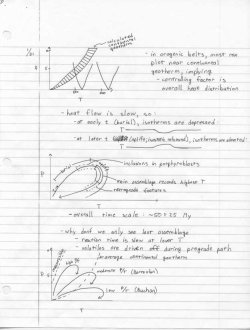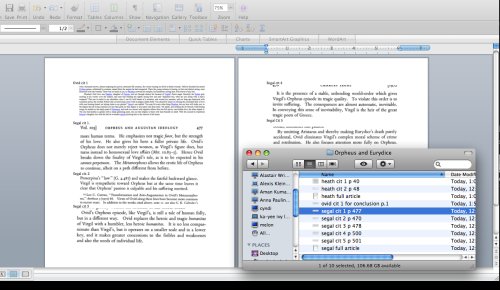Two Notes
Below, I’ve listed two quick administrative notes. One concerns a fancy new upgrade to Study Hacks and the other is an open call for a “focused” students who want to be a part of my new book…
Two Notes
Below, I’ve listed two quick administrative notes. One concerns a fancy new upgrade to Study Hacks and the other is an open call for a “focused” students who want to be a part of my new book…
A Professor Speaks
Earlier today I received an e-mail from David Hirsch, a professor of Geology at Western Washington University. He pointed me toward a web page titled Dave’s Tips for Student Success, which he setup to help the students in his science courses perform better at the college level.
As you might expect considering its source, the page is rich with powerful insights on topics from effective study groups to class attendance. The advice is all built around a common theme (familar to Study Hacks readers): understanding the material is everything and the only thing that matters!
It’s obvious, but it’s worth hearing. Especially when it’s coming from the guy who writes the tests.
In this post, I want to highlight one tip in particular — Dave’s advice on note-taking in science classes.
A Cry for Help
The most common e-mail I receive takes the form of a plea for help. Typically, the student has done poorly on one or two tests, or perhaps got a ‘C’ on an important paper, and is desperate to know what she can do right now to save her semester grades.
In this post, I highlight five articles — selected from the more than 340 that populate the Study Hacks archive — that can provide fast results for students who need immediate help. These articles, on their own, won’t make you into a low-stress, student superstar, but they can help stave off a disastrous end to a tough semester.
Conduct a Mid-Semester Dash
This simple strategy helps you pull yourself out of a muddle of forgotten deadlines and soul-devouring small tasks, and prepare a clean attack for the second half of the semester.
Into the Wild Julie and I are heading off for a mini-vacation. We’ll be in the deliciously computer-free wilds of Vermont for the next week. … Read more
The Business Myth
Business administration and management is the country’s most popular college major. The reasons are not surprising. Many students incorrectly believe that their major needs to be a tight fit with their post-grad job. They note that they want a job working for a business, so they conclude they should major in business.
Sigh.
This trend upsets me for two reasons:
In this post, I want to offer an unconventional alternative to a business major — an alternative that you’ll enjoy and will make potential employers drool over your resume.
The Mysterious Burnout Epidemic
Our friend Leena once told me a sad story. It was about an old high school classmate. This guy was a certified math whiz: he took college-level courses while still in high school, then, after arriving at Stanford, jumped into upper-level subjects and advanced research. Somewhere around his junior year, however, his drive began to falter. As Leena recalls, his energy for math mysteriously faded away. He told her, at one point during this period, that he looked forward to surviving until graduation so he could go find a job in banking and make some money.
He wasn’t overworked: he could easily handle his classes. And he wasn’t lonely: he had plenty of friends. Something inside him just petered out.
Leena’s friend burnt out, and he’s not alone. An increasing number of students suffer from this mysterious affliction, which is marked by a sudden, unexpected drop in enthusiasm and academic performance in a once promising student.
In this article, I want to talk about a common cause of burnouts — a cause I call deep procrastination — and provide some understanding for why it happens and how to prevent it.

Electronic Flatness
A reader recently wrote me with an improvement to my flat outline method for research paper writing. The original method asked you to build an ordered list of the topics you want to address in your paper, and then start typing in quotes from your personal copies of the research sources directly into the outline, putting each quote under the relevant topic. By the time you start writing your paper, this flat outline contains all the information you need — allowing you to focus on writing without having to rummage through a pile of sources.
This reader noted, however, that for some papers, she had to read lots of electronic sources, usually in PDF format. It seemed like a waste to print each of these and then manually type the quotes she needed into her flat outline. So she innovated a new approach.
It works as follows:
Boredom Matters
Earlier this week I listened to a radio interview with New York Times food columnist Mark Bittman. He was discussing his new book Food Matters, which describes practical advice for eating consciously and healthy. One quote, in particular, caught my attention. He mentioned that a factor behind American obesity is that “we’ve lost our tolerance for a little hunger.” As soon as the slightest pang arises in our stomach, we dash off to the nearest source of calories, which is often processed and terrible for us. Bittman notes that it’s okay to be a little hungry during the day.
(Having once lived a famished month in France, I know that other countries certainly concur with this concept.)
This idea got me thinking about a completely different topic: hard work. Inspired by Bittman’s formulation, I found myself asking: have American students lost their tolerance for a little boredom?